A secret, men-only right-wing society with members in influential positions around the country is on a crusade: to recruit a Christian government that will form after the right achieves regime change in the United States, potentially via a “national divorce.”
It sounds like the stuff of fantasy, but it’s real. The group is called the Society for American Civic Renewal (the acronym is pronounced “sacker” by its members). It is open to new recruits, provided you meet a few criteria: you are male, a “trinitarian” Christian, heterosexual, an “un-hyphenated American,” and can answer questions about Trump, the Republican Party, and Christian Nationalism in the right way. One chapter leader wrote to a prospective member that the group aimed to “secure a future for Christian families.”
It’s an uncanny mimicry of the clandestine engine that, in the right-wing’s furthest imaginings, has driven recent social changes and left them feeling isolated and under siege: a shadowy network occupying the commanding heights of business, politics, and culture, open only to a select, elite few, committed to reshaping the United States to align it with the group’s radical values.
The men TPM has identified as behind this group — and they are all men — have a few things in common. They’re all a certain kind of devout Christian traditionalist. They are white. They have means, financial and social, and are engaged in politics.
Until TPM began reporting this story several weeks ago, the membership of the group had remained largely secret. Its existence was known and has been previously reported on by The Guardian, but the details of the group’s mission, membership criteria, board, and internal communications remained outside of public view. Beginning late Thursday, some of the leading members of the group identified by TPM through our reporting came forward publicly to acknowledge their memberships in the organization and published an internal document that TPM had already obtained. They said they were doing so in anticipation of another story by The Guardian.
The members identified by TPM don’t necessarily fit the profile of the disaffected, disgruntled loner or the amped-up, testosterone-fueled militia types often found on the paranoid right-wing fringe. TPM’s reporting has identified as SACR members the president of the influential, Trump-aligned Claremont Institute, Harvard Law grads, and leading businessmen in communities scattered across America.
The group speaks earnestly about itself and tries to downplay its more controversial views. It is, the group’s leaders say, merely another in a long line of fraternal organizations that try to foster civic engagement. But there’s a lot that’s almost zany about the group’s aims and activities. An Idaho chapter sought to fight back against marriage equality by making stickers representing traditional marriage to compete with the rainbow, pro-LGBTQ-rights symbols which adorned coffee shops in the area. In another episode, that chapter supported a quixotic bid to court wealthy conservative donors into funding a website focused on unearthing the spread of DEI in Idaho. The man who incorporated the national umbrella group is an Indiana shampoo tycoon who refers to himself as “maximum leader” and blogs about Rhodesian anti-guerilla tactics and how the must-read dystopian fiction novel for white supremacists, The Camp of the Saints, is actually a vision of America’s present.
Group members hold a distinct vision of America as a latter-day ancient Rome: a crumbling, decadent empire that could soon be replaced by a Christian theocracy. To join, the group demands faithfulness, virtue, and “alignment,” which it describes as “deference to and acceptance of the wisdom of our American and European Christian forebears in the political realm, a traditional understanding of patriarchal leadership in the household, and acceptance of traditional Natural Law in ethics more broadly.” More practically, members must be able to contribute either influence, capability, or wealth in helping SACR further its goals.
“Most of all, we seek those who understand the nature of authority and its legitimate forceful exercise in the temporal realm,” a mission statement reads.
Once in the group, the statement says, members can expect perks: “direct preferential treatment for members, especially in business,” and help in advancement “in all areas of life” from other members.
It’s a vision of society which doesn’t just extend back before the Obergefell decision on same-sex marriage or before the sexual revolution of the ‘60s and ‘70s, before the Civil Rights movement or even before World War II. It goes back further, beyond living memory: to the late 19th century, before the Progressive Era opened the floodgates to what the group regards as a long corruption of America’s founding principles.
Unmasking A Secret Society
TPM first began reporting on SACR in January. Though the group’s membership rolls are secret, some of its activities are out in the open. It maintains a website, all in crimson, in which it advertises its “mark,” and calls on members to rebuild the “frontier-conquering spirit of America.”
An early reporting breakthrough came when we were able to identify a Boise State University professor and Claremont official named Scott Yenor as a possible member of SACR because he appeared on incorporation papers for the group’s Boise lodge. Yenor is a character in his own right, attracting public attention for a November 2021 blow-up when he suggested that elite professions like law and medicine stop recruiting women into their ranks.
Because Boise State is a public university, TPM was able to obtain via public records requests in January and February a trove of Yenor’s office emails that mention SACR. The trove included internal SACR correspondence, documents, and other materials from when the group was first being conceived in late 2020, was founded the following year, and began to grow.
The trove reveals SACR’s core mission: to create a mini-state within a state, composed entirely of Protestant, Catholic, and Orthodox Christian men. It’s explicitly patriarchal, demanding that group members assume a dominant role at home, and celebrates the use of force and existence of authority. Amid all the hearkening back to the founding fathers, America’s first principles, and patriotism, there are few mentions of democracy in the materials TPM reviewed.
Using the Yenor email trove as a starting point, TPM was able to confirm that Yenor is a SACR member, to identify other members of SACR, including prominent people like the president of the Claremont Institute, and to map other chapters of SACR around the country and locate incorporation papers for them, which yielded the identities of other potential SACR members.
The Yenor emails also included a mission statement for SACR, membership criteria, and copies of prayers used by the group in different settings. The emails include extensive internal discussions about the group, its organizing principles, its aims, and its methods for recruiting and expanding nationwide.
TPM continued to report the story, expanding it beyond the Yenor emails, until this week, when it began reaching out directly to the SACR leaders it had been able to identify. It’s not clear whether it was TPM’s outreach or that of The Guardian, as the SACR leaders have since suggested, that prompted them to go public. Regardless, some key figures in the group began to reveal their memberships publicly in advance of the anticipated news coverage.
Nate Fischer, a member in Texas, posted a tweet Thursday evening warning of an imminent story from The Guardian and outing himself as a member. Fischer said that SACR’s previous practice of secrecy was due to “the environment of 2020-21” when the group was first being organized.
The prospect of impending news stories — and Fischer’s tweet — spurred other group members to also reveal themselves on Twitter into Friday. That included Ryan P. Williams, president of the Claremont Institute and a SACR board member, and Andrew Beck, a brand consultant.
In a Friday phone call with TPM, Williams denied that the group was “some cabal with the aim of taking over the federal establishment” and said that it only sought to create a “common citizenship” of the “Americanized and assimilated as the best recipe for a large, multiracial, multi-ethnic republic.”
When asked why SACR documents show that it aims to staff an “aligned future regime” with members, Williams said that the new regime would be a “U.S. Constitutional order brought much closer to its origins after about a century of what we regard as its corruption and undermining by progressivism, which I regard as anti-constitutionalist in its roots and its evolution.”
“This shouldn’t be regarded as anything radical or new,” Williams said. “It’s in a long line of tradition of American civic organizations of like-minded men worried about the direction of their country.”
“Certainly the activity of any members of SACR or any chapters are always meant to be well within the law and constitutional norms of American politics,” he added. “There’s nothing subversive about it. It shouldn’t be regarded that way.”
The self-outing by key figures in SACR did not make public all of the materials that TPM obtained through its reporting, including the trove of Yenor emails and certain internal organizational documents. What follows is what TPM learned from that reporting, and interviews with some of the SACR figures who appeared in the documents.
Howdy Doody Men
SACR stands out in the pantheon of right-wing extremists not necessarily due to the exclusivity of its membership — there are militias and groups across the country which are men only and Christian only, either de facto or by rule.
What sets SACR apart is that its members come from and are recruited from the upper crust of American society. They are wealthy — independent wealth is a requirement for membership, per documents TPM obtained. And they are credentialed.
SACR offers a redoubt for powerful people who take the culture war extremely seriously and believe in their bones that hemorrhaging church membership, the Obergefell decision on same-sex marriage, and the ebbing status of Christian men in American society are an existential threat to their vision for America, and who have the means to build a society on a different path.
Organized as a 501(c)10, Williams described SACR as analogous in structure to the Masons or Moose lodges — a national superstructure with chapters around the country, some public and some not. Its members are, as a rule, secret. But those members who have incorporated chapters, as TPM discovered, end up identified in public records.

In an interview, Williams told TPM that SACR emerged from conversations between himself, self-described “industrialist” Charles Haywood, and others around Claremont in 2020. Skyler Kressin, an Idaho accountant, and Fischer, also participated. The idea, Williams said, came about amid conversations about “civic projects and constitutionalism and the state of America.”
“Part of the scholarly project of the Claremont Institute has been to lament the rise, really since the late 19th century, of a certain different way of thinking about politics and how to do government outside, we would argue, the American constitutional tradition,” he said.
Haywood, a University of Chicago-educated attorney, incorporated SACR and sits on its board. He did not respond to requests for comment from TPM.
Haywood has laid out an elaborate cosmology of America’s place in time, and his own place in America, through hundreds of blog posts he’s written on his website, The Worthy House. To Haywood, American government is a house of cards waiting to be blown over — run by a cabal that he describes as the “brawndo tyranny,” referring to the energy drink from the 2006 cult classic movie Idiocracy. Haywood says he can see what will likely come next: a new feudalism, an archipelago of local “armed patronage networks,” a vision inspired by the groups white settler farmers formed in southern Africa as Blacks struggled for majority rule.
On the blog where he explains these ideas, Haywood refers to himself as “maximum leader.”
In October 2022, Haywood appeared on a podcast with with former Trump official and “Flight 93” essay Michael Anton and others for a discussion about caesarism — the idea that a strongman is needed to solve America’s problems. After referring to an unspecified “secret event” that brought the group together, Haywood said that he “wholeheartedly” endorsed “national divorce” as a solution to the country’s problems.
Since selling his shampoo manufacturing firm in September 2020, Haywood has mobilized. His nonprofit, the Howdy Doody Good Times Foundation, began to contribute to the Claremont Institute.
Howdy Doody has contributed money to SACR as well. Over the following year, a chapter in Dallas, Texas, and three in Idaho were founded. Haywood has said that additional chapters exist; Williams put the total number at beneath one dozen.
Among the emails obtained by TPM are ones that show the organization’s reach. In one January 2023 exchange, Haywood cc’ed a group of people while asking for a board meeting to discuss SACR finances. The men on the exchange do not appear to be down on their luck.
Fischer, a venture capitalist who leads the group’s Dallas chapter, graduated from Harvard Law. Fischer has described leading a private equity career investing in apartment complexes distressed after the 2008 financial crisis.
Also cc-ed was Williams, the Claremont president. Williams confirmed his involvement in the group on Friday on Twitter, writing, “may 1,000 chapters bloom and flourish.” Claremont came into national consciousness in 2021 because it was where Trump co-defendant and co-conspirator John Eastman, the attorney who played a key role in the 2020 election subversion effort, works as a senior fellow.

Under Williams’ leadership, Claremont has become well-known for a vision of America in which the country as we know it is all but lost, set to be replaced by a “regime” that its leaders hope to craft to come after the current, “cold civil war” concludes. While introducing another podcast discussion between Haywood and Anton, Williams called Haywood a “friend of recent years” who was willing to discuss the country’s “decaying republic.”
“The phrase cold civil war is chosen deliberately,” Williams told TPM. “I hope it remains cold indefinitely.”
It’s not only about the republic. Internal SACR messages show that the group envisions itself as stewards of a hard brand of Christianity. Yenor, in one message that he planned to use for recruitment, summed it up: “Our belief is that the country’s track is unsustainable, and the only way to secure a future for Christian families is to keep and take back space now closed to Christians.”
Who is un-SACR?
Who is excluded, in some sense, reveals more about SACR than who is allowed in.
The group bans anyone who is not Christian: Jews, Muslims, Hindus, and others. But it goes further than that and bars “non-trinitarian” Christians; Mormons, Jehovah Witnesses, Christian Scientists, and others cannot be SACR members.
Williams said that the religious exclusivity came from the “long and robust tradition of the intersection between Trinitarian Christianity in a broad sort of ecumenical sense and American civic leadership and statesmanship.”
“Too much ecumenism is sometimes counterproductive in these sorts of ventures,” he added. “Which is not to say that we don’t of course have nothing but toleration in the great American tradition for all faiths as long as they’re genuinely — as long as they are not hostile to American principles and notions of natural rights and constitutionalism.”
Women are not allowed in SACR, whatever their faith. The group emphasizes a traditional role for the man in the household, a robust and muscular exercise of temporal authority by men, and the forceful application of male dominion in civic affairs.
Yenor, the Boise State professor, told TPM in a text that the group’s exclusivity was a way “to bring men together for real community and fraternity,” allowing members to “build each other up and encourage responsibility” in public and private life.
A “SACR Membership Criteria & Recruiting Guide” obtained via TPM’s public records requests shows questions that the group puts to prospective members.
- What are your thoughts on the Republican Party?
- What are your thoughts on “Christian Nationalism”?
- Comment on the Trump presidency and what it entails for the future.
- Describe the dynamic of your household in terms of your role and that of your wife.
- Describe your church community and your and your family’s involvement there
Other criteria for membership include faithfulness (“adherence to traditional Christian sexual ethics”), virtue (“restraint and self-denial; household management; leadership and orderliness”), and alignment, defined as: “deference to and acceptance of the wisdom of our American and European Christian forebears in the political realm, a traditional understanding of patriarchal leadership in the household, and an acceptance of traditional Natural Law in ethics more broadly.”
Finally, members are asked to possess one of these three qualities: influence, capability (“any skill conducive to the technical work of productive entrepreneurship; lawfare; cybersecurity”), or wealth.
If you make it in, you’re asked to pay regular dues and appear at meetings once a month. Chapter members’ names are hidden, as are “national or Chapter initiatives.”
Fischer posted a copy of a mission statement and objectives already previously obtained by TPM on Twitter Thursday evening. The group has public and non-public descriptions of its purpose and goals. In an “internal” version of the mission statement, SACR says “we are un-hyphenated Americans and we believe in a particular Christianity that is not blurred by modernist philosophies.”
“We are willing to act decisively to secure permanently, as much as anything is permanent, the political and social dominance of that ideal,” the document says.
Why the big secret?
Perhaps the most startling element of SACR is one of its long-term objectives. Per the mission statement obtained by TPM, SACR aims to have its members form the government of an “aligned future regime.”
“They would be next generation—not founding participants, but those who joined as the project of civic renewal grows deep roots,” the document reads. “That is, men who ‘grow up in the system.’”
Other goals include providing “preferential treatment for members, especially in business,” and to both “coordinate allied fraternal networks” and “defend fraternal networks … against attacks by those opposed to civic renewal, and strongly deter such attacks.”
In Yenor’s Boise chapter, SACR members attempted to craft a “Statement on Marriage” in which local church leaders would proclaim an “intentional effort to celebrate the benefits of family life” because the “culture is hostile to Christian marriage.” To do that, the group would “promote marriage publicly through a pro-marriage sticker” to be spread around the Boise region.
The same group held events with speakers, including writer and policy researcher Aaron Renn. At one point, emails show, Yenor pitched an Idaho news website to Claremont funders called Action Idaho, saying that SACR would take care of back-end work for the venture.
Other public remarks from members point towards the group’s activities.
After The Guardian published its initial story on the group over the summer, a small controversy erupted among evangelicals who regarded Haywood’s views as dangerous and the prospect of a certain strain of Christianity taking control of the government as troubling.
Fischer hit back in a podcast appearance, describing SACR as a “big-tent thing where men get together.”
“So the local chapters or lodges will have a meeting and maybe 15 guys get together and a speaker comes in and talks about something political, sometimes it’s a political candidate or whatever. And then we learn and sometimes we just hang out,” he said. “There’s no sort of great secrecy associated with it. There’s a little degree of confidentiality because there’s guys there who are at companies where even being associated with a group that is all men would be seen as suspicious.”
SACR and its members harp on the idea that America is in a fatal stage of rot, and that they are an oppressed people waiting to rise up on behalf of a silent majority.
The SACR website speaks to the deeply held grievance and sense of a lack of masculine purpose which animates the group. SACR exists, the website says, because “a man is no longer encouraged to fly to the stars,” because “those who rule today spit on such ambitions; they corrupt the sinews of America.”
“They have alienated men from family, community, and God. We counter and conquer this poison, rebuilding a society where a man can find genuine fulfilment, true to his nature and calling, rejoicing in virtue and vitality,” the website says, before offering a Google docs link where men can apply.
At the end of the day, SACR’s members are not oppressed. Claremont is free to publish whatever it likes — it’s widely seen as tremendously influential on the right generally and in MAGA circles specifically. SACR chapters can meet; Haywood can blog — in fact, on Tuesday he wrote an encomium to The Camp of the Saints, a 1970s French novel in which a horde of Indian immigrants overwhelms, degrades, and exterminates the white West.
“The goal of the Left was always total expropriation of white people and then, if at all possible, their extermination, a goal made explicit by many powerful people in 2020,” Haywood wrote. “How, given this history, should white Americans respond?”
SACR may be his answer. In emails from November 2020, Yenor wrote to Skyler Kressin, the head of the SACR chapter in Coeur d’Alene, Idaho, and on the group’s national board.
Yenor sent a screenshot of an Amazon link to “The Super Afrikaners,” a 1979 nonfiction account of the Afrikaner Broederbond, a semi-secret society which ruled South Africa under apartheid.
“That good?” Yenor titled the subject line, highlighting the book — long out of print — and its $95.62 price.
“That’s the one,” Kressin replied.
South Africa, with its visions of white settlers driven away from status and wealth, appear consistently in Haywood’s writings, and in Fischer’s as well. The Broederbond, an Afrikaner-only, Calvinist-only group of elites which functioned as a series of hundreds of independent “cells” across the country, offers an eerie reflection of SACR’s structure. Williams told TPM that the Afrikaner Broederbond came up in conversations over what SACR would be, but denied that it served as a model for the group.
The grievance, perceived loss of status, and lack of metaphysical meaning that these men feel are very real, to them. But there’s enough in America’s own history to understand the aims and tradition in which SACR is operating.
Correction: An earlier version of this article misidentified writer and policy researcher Aaron Renn as a “self-identified Christian Nationalist.” Renn does not describe himself as a Christian nationalist but rather has been a critic of Christian nationalism. We regret the error.


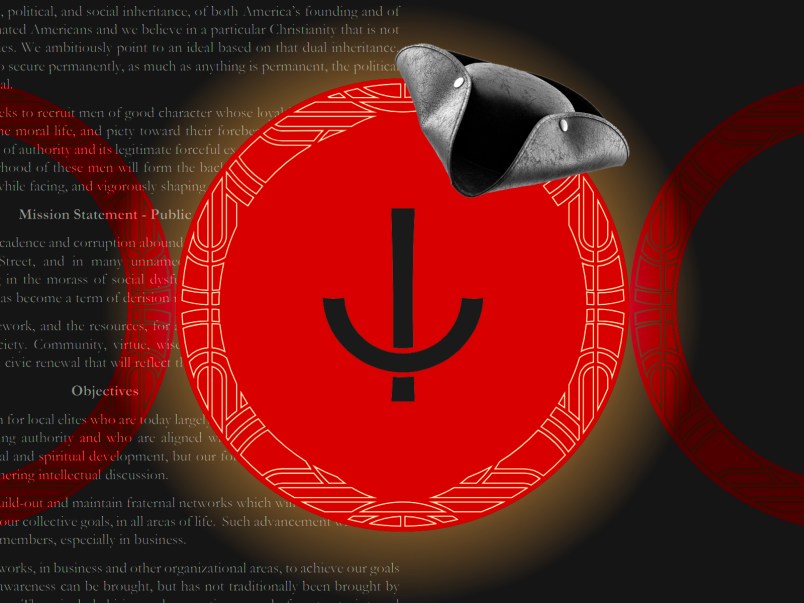
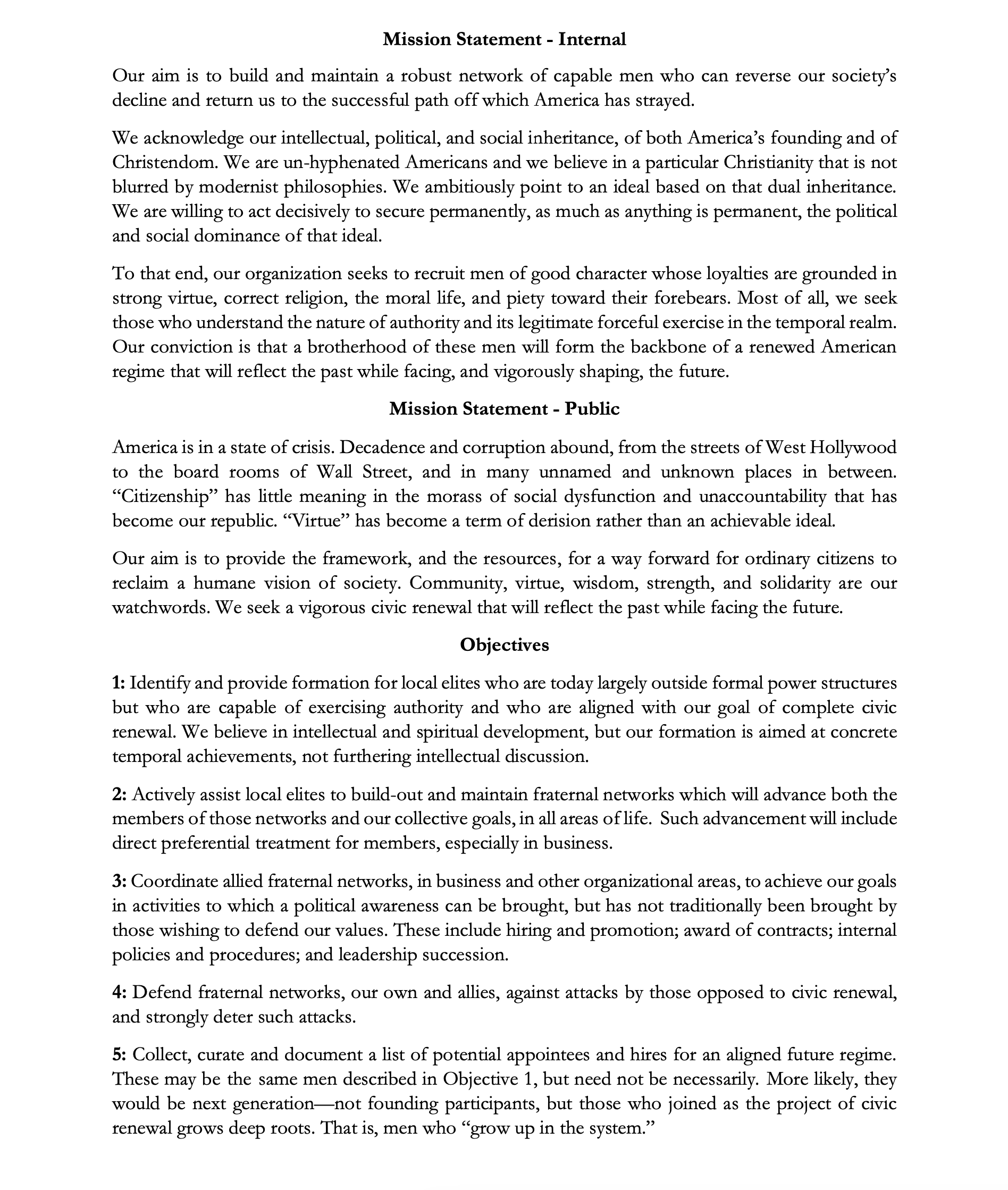
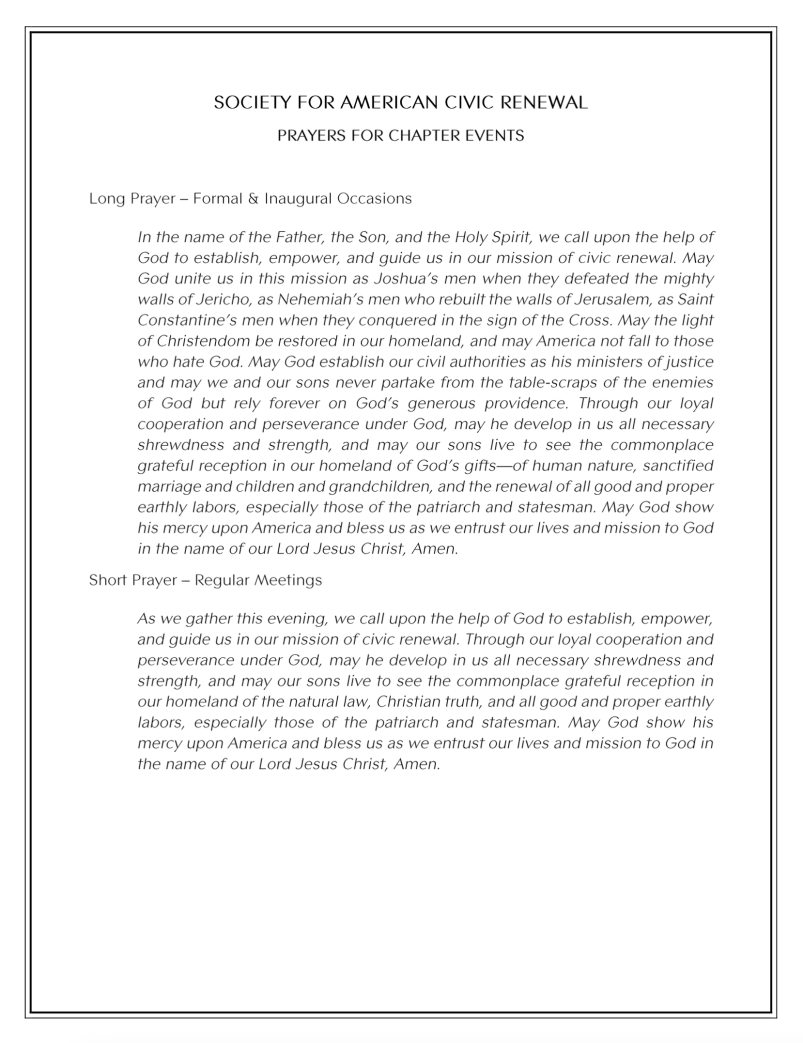
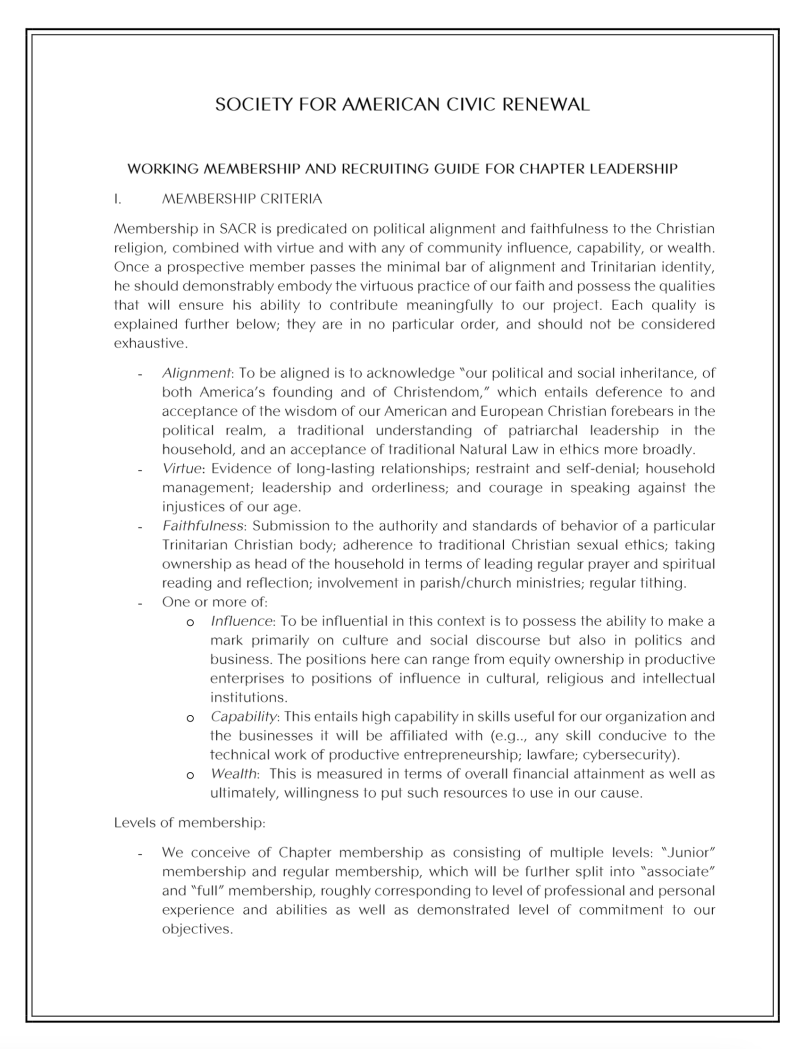
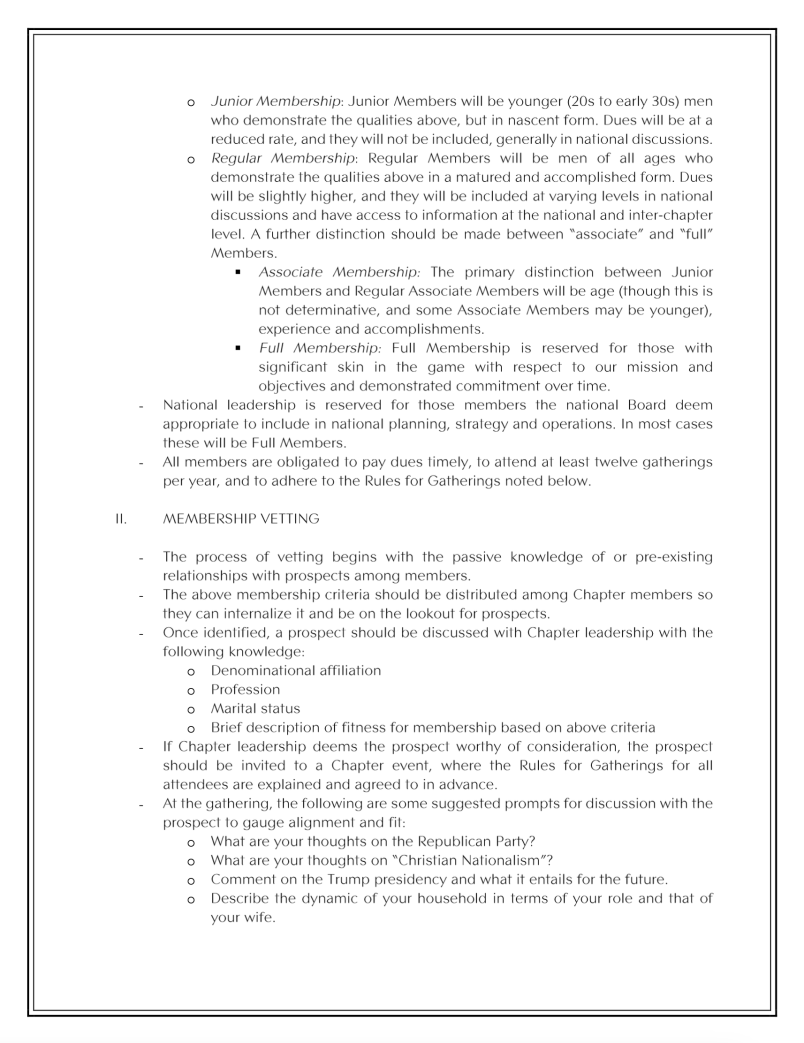
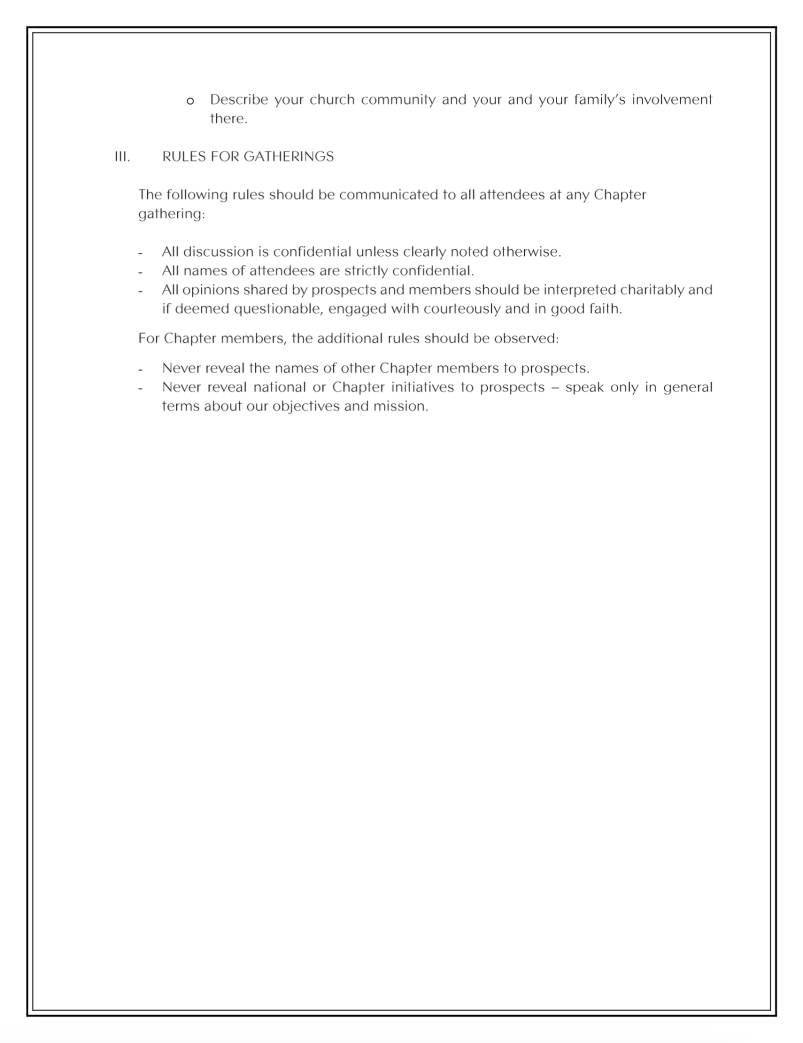




So… the klan without the hoods.
Random observations:
They’re lucky to have a brand consultant involved. It sounds like he has some work to do.
These guys sound like the pseudo-intellectual equivalent of the secessionist guys who conduct military drills in the woods and live a Spartan life.
Gee, what if they put their efforts into making the world better for everyone, not just themselves?
It sounds like at least some of them recognize that the whole secrecy thing is counter-productive. But then again, they know full well that, in the light of day, most people aren’t going to buy this stuff. Most women won’t, obviously.
If they aren’t embarrassed now, they sure as hell will be.
This is an example of people with too much time on their hands.
Oh, another thing is that this type of secret society is going to attract some real oddballs, to say the least.
More seriously, many of these folks probably need to feel like they’re a part of something. Let’s try to be compassionate about them, where we can. They could use some understanding.
Under his eye.
May the womb open.
Blessed Day (indeed)!
Margaret Atwood wrote about these men 40 years ago, explaining at the time that her guiding premise while writing The Handmaid’s Tale was that nothing depicted in it wouldn’t have already been perpetrated in some form in history.
She was well aware too that the seeds persist for authoritarian patriarchal extremism to return, as hinted at in the brief epilogue at the end of the novel, when men in the group studying the “historical documents” of the unnamed handmaiden are subtly dismissive of their female colleagues.
Some incels grow up and get jobs, even wives and families. But their inherit nature remains. Hence, the buffoons behind the pretense of this bullshit fantasy.
Apparently each of them felt insulted or ignored by a woman at some point and got their fe-fes hurt?
Looks like a receptive group to purchase all the ball tanning equipment.
They should just go with the original name…The He-Man Woman Haters Club!
I wonder if one of the perks of membership is providing private banking services to the speaker of the US House of Representatives.